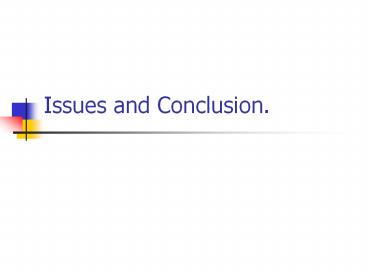Issues and Conclusion. - PowerPoint PPT Presentation
1 / 12
Title:
Issues and Conclusion.
Description:
Hyponyms/Hypernyms. lead to semantics altering translations ... press hyponym periodical-publication. periodical hyponym periodical-publication ... – PowerPoint PPT presentation
Number of Views:114
Avg rating:3.0/5.0
Title: Issues and Conclusion.
1
Issues and Conclusion.
2
Ontology Bottlenecks
- Where do they come from
- How do you keep them up to date
- What about when they change
- Multiple ontologies
- How do you link them to the services
3
Basic Ontological IssuesCommon Bear Traps
- Formalism restricts what can be said
- Dont torture it e.g. no negation no shared
variables - Semantic Redundancy
- More than one way to say ? equivalence
- Risk for links as well as concepts
- hasColour vs hasFeature Colour hasState
- Ambiguity
- Default Reasoning
- Birds fly, except penguins, ostriches and Dodos
- Partonomy and transitivity
- Spatial reasoning
4
Basic Ontological Issues Common Bear Traps
- Structure vs Process
- Ulcer vs Ulceration
- Substance vs Structure
- Glucose (mass weight, chemical structure)
- Changed state vs Change in state
- Increased vs Increasing
- Selectors
- Left hand left not actually a spatial
signifier - Numbers, ranges
- Concrete domains
5
Advanced Ontological IssuesMaintenance
- Maintenance
- Large ontology necessarily collaborative
undertaking - Need way to make editing task comprehensible (and
shareable) - Multiuser environments, coupling strategies
- Source sharing, organisation, training
- Performance and Scaling
- What can be done depends on how long an
interation / experiment requires - Working Method
- Iterate, test, iterate, test, iterate, test
6
Advanced Ontological IssuesDelivery
- Philosophical perfection does not guarantee
utility - Inevitably complex
- But useless if too confusing
- How to systematically simplify / guide ?
- Contrains what you do
- Think about delivery and your user
- How to make it look familiar ?
- Need for navigational hierarchies
7
Coding Confusion An example
Suitcase Luggage Attache case Model
Person Woman Adults Headcloth Cloth Scarf Standing
Background Brown Blue Chemise Dress Tunics Clothe
s Brass Instrument French Horn Horn Tuba
X X X X X
X X X X X X X
X X X X X X X
X X X X X X X X X X
X X X
X X X X X X
X X X X X X
X X X X X X
8
- Fuzziness
9
Inter-ontological relationships
- Synonyms
- leads to semantics preserving translations
- Hyponyms/Hypernyms
- lead to semantics altering translations
- typically results in loss of recall and precision
- List of Hyponyms
- technical-manual hyponym manual
- book hyponym book
- proceedings hyponym book
- thesis hyponym book
- misc-publication hyponym book
- technical-reports hyponym book
- press hyponym periodical-publicatio
n - periodical hyponym periodical-publicatio
n
10
Ontology Integration and Query
Rewriting
union(Journal, union(Book, Proceedings, ...,
Misc-Publication)), union(Periodical-Publication,
union(Book, ....., Misc-Publication)),
Document
Journal, Periodical-Publication
union(Book, Proceedings, ..., Misc-Publication)
Technical-Manual
GuideBook
11
- The technical advantages of knowledge modeling
are obvious. Knowledge bases can be automatically
checked for consistency they support inference
mechanisms which derive data which have not been
explicitly stored they also offer extensive
request and navigation facilities. However, the
most immediate benefit of knowledge base design
lies in the modeling process itself, through the
effort of explication, organization and
structuration sic of the knowledge it
requires. - Editorial Bioinformatics, July 2000
12
- How much do they cost?
- Lots.































